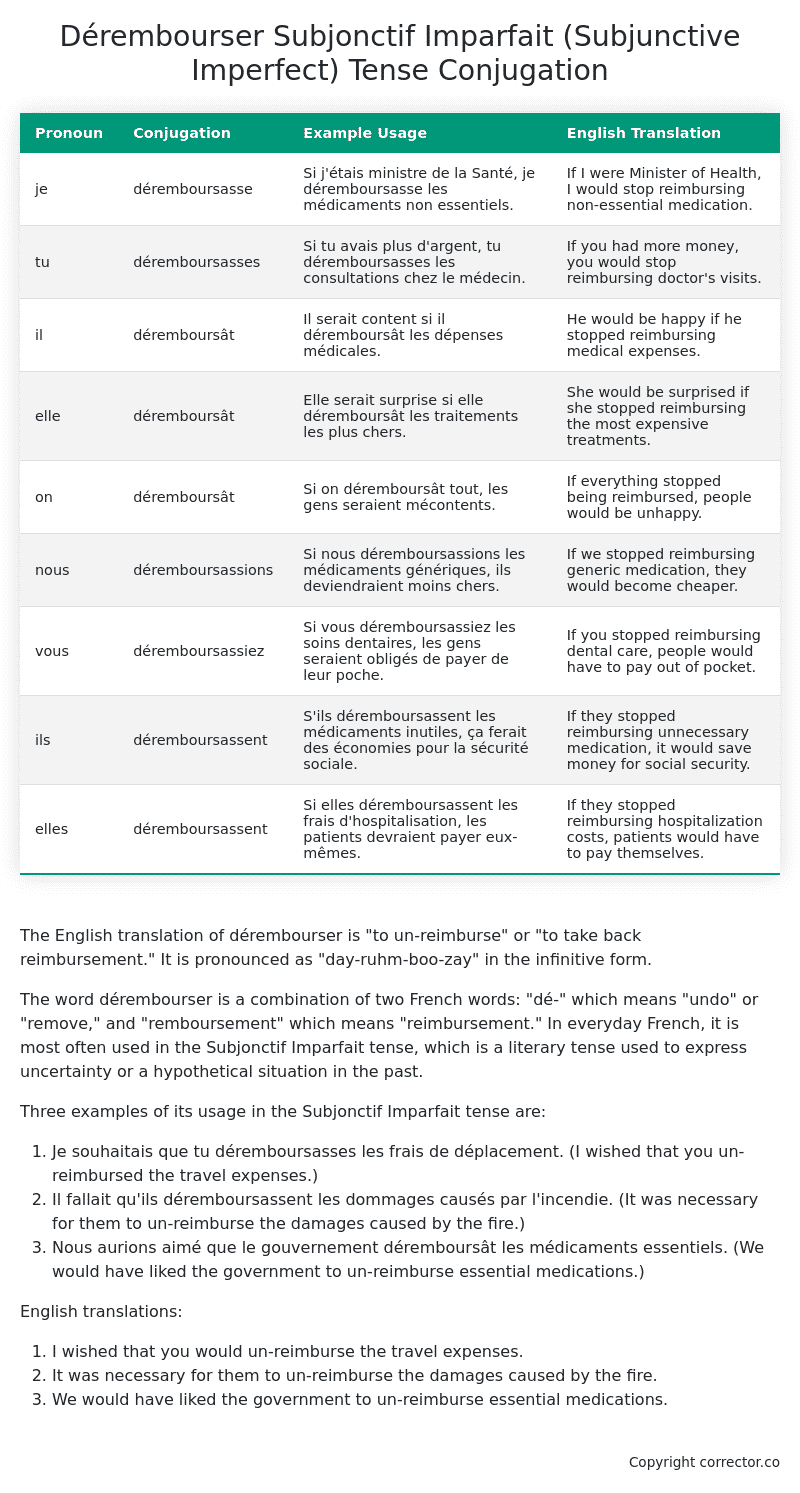Subjonctif Imparfait (Subjunctive Imperfect) Tense Conjugation of the French Verb dérembourser
Introduction to the verb dérembourser
The English translation of dérembourser is “to un-reimburse” or “to take back reimbursement.” It is pronounced as “day-ruhm-boo-zay” in the infinitive form.
The word dérembourser is a combination of two French words: “dé-” which means “undo” or “remove,” and “remboursement” which means “reimbursement.” In everyday French, it is most often used in the Subjonctif Imparfait tense, which is a literary tense used to express uncertainty or a hypothetical situation in the past.
Three examples of its usage in the Subjonctif Imparfait tense are:
- Je souhaitais que tu déremboursasses les frais de déplacement. (I wished that you un-reimbursed the travel expenses.)
- Il fallait qu’ils déremboursassent les dommages causés par l’incendie. (It was necessary for them to un-reimburse the damages caused by the fire.)
- Nous aurions aimé que le gouvernement déremboursât les médicaments essentiels. (We would have liked the government to un-reimburse essential medications.)
English translations:
- I wished that you would un-reimburse the travel expenses.
- It was necessary for them to un-reimburse the damages caused by the fire.
- We would have liked the government to un-reimburse essential medications.
Table of the Subjonctif Imparfait (Subjunctive Imperfect) Tense Conjugation of dérembourser
| Pronoun | Conjugation | Example Usage | English Translation |
|---|---|---|---|
| je | déremboursasse | Si j’étais ministre de la Santé, je déremboursasse les médicaments non essentiels. | If I were Minister of Health, I would stop reimbursing non-essential medication. |
| tu | déremboursasses | Si tu avais plus d’argent, tu déremboursasses les consultations chez le médecin. | If you had more money, you would stop reimbursing doctor’s visits. |
| il | déremboursât | Il serait content si il déremboursât les dépenses médicales. | He would be happy if he stopped reimbursing medical expenses. |
| elle | déremboursât | Elle serait surprise si elle déremboursât les traitements les plus chers. | She would be surprised if she stopped reimbursing the most expensive treatments. |
| on | déremboursât | Si on déremboursât tout, les gens seraient mécontents. | If everything stopped being reimbursed, people would be unhappy. |
| nous | déremboursassions | Si nous déremboursassions les médicaments génériques, ils deviendraient moins chers. | If we stopped reimbursing generic medication, they would become cheaper. |
| vous | déremboursassiez | Si vous déremboursassiez les soins dentaires, les gens seraient obligés de payer de leur poche. | If you stopped reimbursing dental care, people would have to pay out of pocket. |
| ils | déremboursassent | S’ils déremboursassent les médicaments inutiles, ça ferait des économies pour la sécurité sociale. | If they stopped reimbursing unnecessary medication, it would save money for social security. |
| elles | déremboursassent | Si elles déremboursassent les frais d’hospitalisation, les patients devraient payer eux-mêmes. | If they stopped reimbursing hospitalization costs, patients would have to pay themselves. |
Other Conjugations for Dérembourser.
Le Present (Present Tense) Conjugation of the French Verb dérembourser
Imparfait (Imperfect) Tense Conjugation of the French Verb dérembourser
Passé Simple (Simple Past) Tense Conjugation of the French Verb dérembourser
Passé Composé (Present Perfect) Tense Conjugation of the French Verb dérembourser
Futur Simple (Simple Future) Tense Conjugation of the French Verb dérembourser
Futur Proche (Near Future) Tense Conjugation of the French Verb dérembourser
Plus-que-parfait (Pluperfect) Tense Conjugation of the French Verb dérembourser
Passé Antérieur (Past Anterior) Tense Conjugation of the French Verb dérembourser
Futur Antérieur (Future Anterior) Tense Conjugation of the French Verb dérembourser
Subjonctif Présent (Subjunctive Present) Tense Conjugation of the French Verb dérembourser
Subjonctif Passé (Subjunctive Past) Tense Conjugation of the French Verb dérembourser
Subjonctif Imparfait (Subjunctive Imperfect) Tense Conjugation of the French Verb dérembourser (this article)
Conditionnel Présent (Conditional Present) Tense Conjugation of the French Verb dérembourser
Conditionnel Passé (Conditional Past) Tense Conjugation of the French Verb dérembourser
L’impératif Présent (Imperative Present) Tense Conjugation of the French Verb dérembourser
L’infinitif Présent (Infinitive Present) Tense Conjugation of the French Verb dérembourser
Struggling with French verbs or the language in general? Why not use our free French Grammar Checker – no registration required!
Get a FREE Download Study Sheet of this Conjugation 🔥
Simply right click the image below, click “save image” and get your free reference for the dérembourser Subjonctif Imparfait tense conjugation!

Dérembourser – About the French Subjonctif Imparfait (Subjunctive Imperfect) Tense
Formation
Common Everyday Usage Patterns
Interactions with Other Tenses
Subjonctif Présent
Indicatif Passé Composé
Conditional
Conditional Perfect
Summary
I hope you enjoyed this article on the verb dérembourser. Still in a learning mood? Check out another TOTALLY random French verb conjugation!


